Medal of Honor? Dorie Miller’s fans keep fighting to honor black sailor’s Pearl Harbor heroism
(Dallas Morning News) It has been 75 years since Doris “Dorie” Miller, a black mess attendant, grabbed control of a machine gun he had never been allowed to use so he could help defend the USS West Virginia during the Pearl Harbor attack.
In the decades since, Miller has become one of the most well-known black heroes of World War II. As the war continued, Miller was depicted on a poster used to sell war bonds and recruit black soldiers. His acts of heroism were portrayed by Cuba Gooding Jr. in the movie Pearl Harbor. And his story is featured prominently in the newly opened National Museum of African American History and Culture.
But for all of the recognition the Waco native has earned, one honor is missing: Miller, who died in combat in 1943, never received the Medal of Honor. And for decades, U.S. Rep. Eddie Bernice Johnson, D-Dallas, has been fighting to change that.
“I have lobbied the Department of the Navy about as much as I know how to lobby them,” Johnson said. “I’ve been working on it ever since I’ve been here, and I don’t know that I am any closer.” (read more)
The Upcoming 115th Congress Will Open With The Most African-Americans In History
 The 115th Congress will be sworn into service on January 3, 2017, and is scheduled to run for two years until the end of the year in 2018. As a result of the 2016 election, the 115th Congress will be one of the most diverse ever, including an historically high number of African Americans. Specifically, beginning in 2017 there will be a record 51 African Americans in the Congress: 3 in the US Senate (including only the second African American woman in history), and 48 in the US House of Representatives. This means that African Americans will represent just under 10% of the entire Congress. In the 114th Congress, which covered the years 2015 – 2016 and is almost over, there were 48 African Americans in both the House and the Senate, which translates to just under 9%.
The 115th Congress will be sworn into service on January 3, 2017, and is scheduled to run for two years until the end of the year in 2018. As a result of the 2016 election, the 115th Congress will be one of the most diverse ever, including an historically high number of African Americans. Specifically, beginning in 2017 there will be a record 51 African Americans in the Congress: 3 in the US Senate (including only the second African American woman in history), and 48 in the US House of Representatives. This means that African Americans will represent just under 10% of the entire Congress. In the 114th Congress, which covered the years 2015 – 2016 and is almost over, there were 48 African Americans in both the House and the Senate, which translates to just under 9%.
African Americans did not serve in Congress until the 41st Congress (1869-1870) during the Reconstruction period following the Civil War. No African Americans served in Congress from the 57th Congress (1901-1902) until the 71st Congress (1929-1930), and from that point on the number has grown steadily. (read more)
The fight for Rosewood Courts: How to save African-American history in East Austin
 On the 50th anniversary of the National Historic Preservation Act, Dr. Fred McGhee and I sit in an Austin, Texas, coffee shop just down the street from the first African-American housing project in our nation’s history: Rosewood Courts. McGhee, surrounded by young professionals, artists, and students nursing single-origin coffee and Topo Chicos, is explaining to me how he became so deeply invested in preserving this public housing complex in East Austin.
On the 50th anniversary of the National Historic Preservation Act, Dr. Fred McGhee and I sit in an Austin, Texas, coffee shop just down the street from the first African-American housing project in our nation’s history: Rosewood Courts. McGhee, surrounded by young professionals, artists, and students nursing single-origin coffee and Topo Chicos, is explaining to me how he became so deeply invested in preserving this public housing complex in East Austin.
The population boom that brought those professionals, artists, and students here has created a demand for density and housing that’s redefining the neighborhood. The infamous 1928 master plan that encouraged city leaders to redline black residents into East Austin laid the groundwork for the current situation, as the city disinvested in the area and African-American residents who could afford to do so left East Austin for the suburbs. Today, homes once belonging to black lawyers, professors, doctors, and families are now available for cheap and are being razed by the block.
That’s the fate McGhee—who describes himself as an archaeologist, green builder, and raconteur—is hoping to avoid for Rosewood Courts. The Housing Authority of the City of Austin, which owns Rosewood, would like to redevelop the site into a denser complex with a mix of income levels and some homes for sale. (read more)
TIPHC Bookshelf
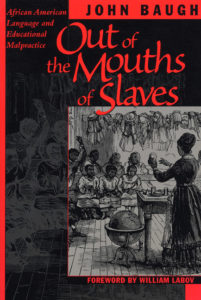 Published scholarship on black history in Texas is growing and we’d like to share with you some suggested readings, both current and past, from some of the preeminent history scholars in Texas and beyond. We invite you to take a look at our bookshelf page — including a featured selection — and check back as the list grows. A different selection will be featured each week. We welcome suggestions and reviews. This week, we offer, “Out of the Mouths of Slaves, African American Language and Educational Malpractice,” by John Baugh.
Published scholarship on black history in Texas is growing and we’d like to share with you some suggested readings, both current and past, from some of the preeminent history scholars in Texas and beyond. We invite you to take a look at our bookshelf page — including a featured selection — and check back as the list grows. A different selection will be featured each week. We welcome suggestions and reviews. This week, we offer, “Out of the Mouths of Slaves, African American Language and Educational Malpractice,” by John Baugh.
When the Oakland, California, school board called African American English “Ebonics” and claimed that it “is not a black dialect or any dialect of English,” they reignited a debate over language, race, and culture that reaches back to the era of slavery in the United States. In this book, John Baugh, an authority on African American English, sets new parameters for the debate by dissecting and challenging many of the prevailing myths about African American language and its place in American society.
Baugh’s inquiry ranges from the origins of African American English among slaves and their descendants to its recent adoption by standard English speakers of various races. Some of the topics he considers include practices and malpractices for educating language minority students, linguistic discrimination in the administration of justice, cross-cultural communication between Blacks and whites, and specific linguistic aspects of African American English. This detailed overview of the main points of debate about African American language will be important reading for both scholars and the concerned public.
This Week In Texas Black History, Dec. 4-10
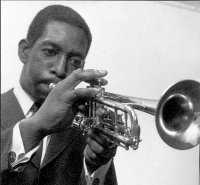 5 – On this day in 1972, Austin musician Kenny Dorham died of kidney failure at age 48 in New York City. Dorham was one of the great trumpet pioneers of the bebop era, and worked with many of the bebop giants in the ’40s and ’50s, including Dizzy Gillespie, Billy Eckstine, Lionel Hampton, and Thelonius Monk.
5 – On this day in 1972, Austin musician Kenny Dorham died of kidney failure at age 48 in New York City. Dorham was one of the great trumpet pioneers of the bebop era, and worked with many of the bebop giants in the ’40s and ’50s, including Dizzy Gillespie, Billy Eckstine, Lionel Hampton, and Thelonius Monk.
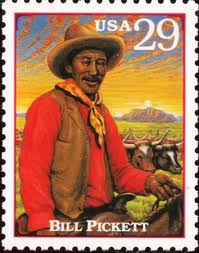 5 – Willie M. “Bill” Pickett, the cowboy known as the “Dusky Demon” and inventor of the rodeo sport of bulldogging (steer wrestling), was born on this day in 1870 in Taylor, northeast of Austin. In 1971, Pickett was the first black man elected to the National Cowboy Hall of Fame and Western Heritage Center in Oklahoma. In 1993, the U.S. Postal Service honored him as part of its Legends of the West series of stamps.
5 – Willie M. “Bill” Pickett, the cowboy known as the “Dusky Demon” and inventor of the rodeo sport of bulldogging (steer wrestling), was born on this day in 1870 in Taylor, northeast of Austin. In 1971, Pickett was the first black man elected to the National Cowboy Hall of Fame and Western Heritage Center in Oklahoma. In 1993, the U.S. Postal Service honored him as part of its Legends of the West series of stamps.
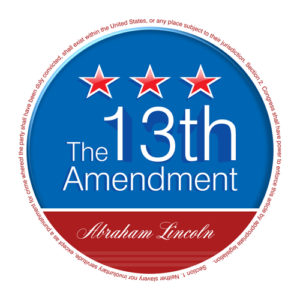 6 – The 13th Amendment, abolishing slavery, was ratified by three-fourths of the states on this day in 1865, officially becoming part of the U.S. Constitution. The amendment declared that “neither slavery nor involuntary servitude, except as a punishment for crime whereof the party shall have been duly convicted, shall exist within the United States, or any place subject to their jurisdiction.” However, when the newly elected 11th Texas Legislature met in August 1866, the members refused to ratify either the 13th or 14th Amendment (granting citizenship to African Americans). The legislature wanted to return Texas as much as possible to the way it was before the war and restrict the rights of African Americans. Texas would not ratify the 13th amendment until February 18, 1870. Mississippi would be the last state to comply, ratifying the amendment in 1995, but the state didn’t officially notify the U.S. Archivist until 2012, when the ratification finally became official.
6 – The 13th Amendment, abolishing slavery, was ratified by three-fourths of the states on this day in 1865, officially becoming part of the U.S. Constitution. The amendment declared that “neither slavery nor involuntary servitude, except as a punishment for crime whereof the party shall have been duly convicted, shall exist within the United States, or any place subject to their jurisdiction.” However, when the newly elected 11th Texas Legislature met in August 1866, the members refused to ratify either the 13th or 14th Amendment (granting citizenship to African Americans). The legislature wanted to return Texas as much as possible to the way it was before the war and restrict the rights of African Americans. Texas would not ratify the 13th amendment until February 18, 1870. Mississippi would be the last state to comply, ratifying the amendment in 1995, but the state didn’t officially notify the U.S. Archivist until 2012, when the ratification finally became official.
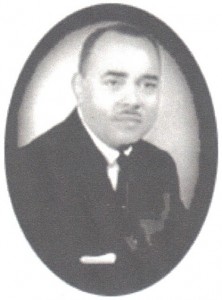 7 — Publisher Julius Carter was born this day in 1914 in Houston. Carter founded the Forward Times newspaper in 1960 when segregation was in full force in Houston. Carter realized his vision of the Forward Times becoming a voice for the city’s African-American community.
7 — Publisher Julius Carter was born this day in 1914 in Houston. Carter founded the Forward Times newspaper in 1960 when segregation was in full force in Houston. Carter realized his vision of the Forward Times becoming a voice for the city’s African-American community.
 7 – Philanthropist and founder of Pro-Line Corporation, maker of black hair products, Comer Cottrell, Jr., was born on this day in 1931 in Mobile, Alabama. Cottrell founded Pro-Line in Los Angeles in 1970, but relocated the business to Dallas in 1980. Pro-Line became the largest black-owned firm in the Southwest and one of the most profitable black companies in the United States. He is noted for popularizing the “Jheri curl” hairstyle. Cottrell became part owner of Texas Rangers baseball team in 1989, becoming the first African-American to hold such a stake in a Major League Baseball team and was also the first black member of the powerful Dallas Citizens Council.
7 – Philanthropist and founder of Pro-Line Corporation, maker of black hair products, Comer Cottrell, Jr., was born on this day in 1931 in Mobile, Alabama. Cottrell founded Pro-Line in Los Angeles in 1970, but relocated the business to Dallas in 1980. Pro-Line became the largest black-owned firm in the Southwest and one of the most profitable black companies in the United States. He is noted for popularizing the “Jheri curl” hairstyle. Cottrell became part owner of Texas Rangers baseball team in 1989, becoming the first African-American to hold such a stake in a Major League Baseball team and was also the first black member of the powerful Dallas Citizens Council.
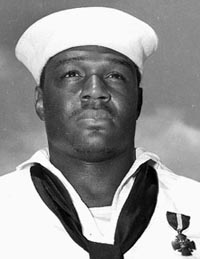 7 – On this day in 1941, Navy messman Doris Miller, a Waco native was aboard the USS West Virginia when the Japanese attacked Pearl Harbor. Miller moved several wounded sailors to safety and then manned an anti-aircraft gun, for which he had no training (because the Navy limited black sailors to non-combat roles and menial duties), and fired at attacking planes. For his actions, Miller was the first African-American to be awarded the Navy’s second highest honor, the Navy Cross.
7 – On this day in 1941, Navy messman Doris Miller, a Waco native was aboard the USS West Virginia when the Japanese attacked Pearl Harbor. Miller moved several wounded sailors to safety and then manned an anti-aircraft gun, for which he had no training (because the Navy limited black sailors to non-combat roles and menial duties), and fired at attacking planes. For his actions, Miller was the first African-American to be awarded the Navy’s second highest honor, the Navy Cross.
 9 – Taylor native Bill Pickett became the first African-American elected to the Rodeo Cowboy Hall of Fame on this day in 1971. Pickett is noted as the originator of “steer wresting” with his technique of “bulldogging” steers, during which Pickett would subdue unruly cows by jumping from his horse to the cow, wrestling him to the ground, then biting the creature’s lip. Pickett said he got the idea from watching dogs do the same thing when they were herding cows. Known as the “Dusky Demon,” Pickett has also been honored by the U.S. Postal Service as part of its “Legends of the West” series of commemorative stamps.
9 – Taylor native Bill Pickett became the first African-American elected to the Rodeo Cowboy Hall of Fame on this day in 1971. Pickett is noted as the originator of “steer wresting” with his technique of “bulldogging” steers, during which Pickett would subdue unruly cows by jumping from his horse to the cow, wrestling him to the ground, then biting the creature’s lip. Pickett said he got the idea from watching dogs do the same thing when they were herding cows. Known as the “Dusky Demon,” Pickett has also been honored by the U.S. Postal Service as part of its “Legends of the West” series of commemorative stamps.
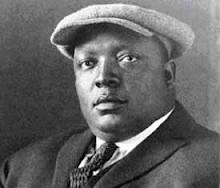 9 – On this day in 1930, Calvert native Rube Foster, founder of baseball’s first successful all-black league, the Negro National League, died in Kankakee, Illinois. Known as the “Father of Black Baseball,” Foster was a star pitcher and manager for the Chicago American Giants, as well as league commissioner. The NNL, headquartered in Kansas City, Mo., had teams in the South and Midwest including Texas teams such as the Austin Black Senators, Fort Worth Black Panthers, and the Houston Eagles. Foster was elected to the Baseball Hall of Fame in 1981.
9 – On this day in 1930, Calvert native Rube Foster, founder of baseball’s first successful all-black league, the Negro National League, died in Kankakee, Illinois. Known as the “Father of Black Baseball,” Foster was a star pitcher and manager for the Chicago American Giants, as well as league commissioner. The NNL, headquartered in Kansas City, Mo., had teams in the South and Midwest including Texas teams such as the Austin Black Senators, Fort Worth Black Panthers, and the Houston Eagles. Foster was elected to the Baseball Hall of Fame in 1981.
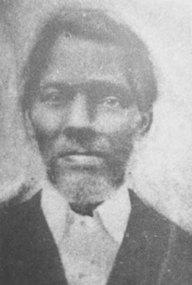 10 – This day marks the passing of Rev. Jacob Fontaine in 1898. Born in Arkansas, Fontaine was a Baptist minister, publisher, and community leader who came to Austin in 1839 with his owner, Rev. Edward Fontaine, who served as personal secretary for Texas president Mirabeau B. Lamar. In 1867, Jacob Fontaine founded the First Baptist Church (Colored) on the same property where the Austin History Center now sits. In 1876, he established the Gold Dollar, one of the first black weekly newspapers in the South and the first newspaper under black ownership in Austin. He also participated in the founding of five African-American churches as well as the St. John Regular Missionary Baptist Association.
10 – This day marks the passing of Rev. Jacob Fontaine in 1898. Born in Arkansas, Fontaine was a Baptist minister, publisher, and community leader who came to Austin in 1839 with his owner, Rev. Edward Fontaine, who served as personal secretary for Texas president Mirabeau B. Lamar. In 1867, Jacob Fontaine founded the First Baptist Church (Colored) on the same property where the Austin History Center now sits. In 1876, he established the Gold Dollar, one of the first black weekly newspapers in the South and the first newspaper under black ownership in Austin. He also participated in the founding of five African-American churches as well as the St. John Regular Missionary Baptist Association.
 10 – On this day in 2011, Kevin Sumlin became the first black head football coach at Texas A&M University. In his first year as the Aggies’ head coach, Sumlin led A&M to a No. 5 national ranking and the program’s first 11-win season since 1998. Sumlin was a national coach of the year finalist and coached the first-ever freshman to win the Heisman Trophy – quarterback Johnny Manziel. Sumlin went to Texas A&M after leading the University of Houston Cougars to a school-record 13 victories and the program’s highest finish (No. 20) in the Bowl Championship Series standings in 2011. Sumlin posted a 35-17 overall record and led the Cougars to three bowl games fueled by his high-powered offense that led the nation in passing, total and scoring offense that set NCAA FBS team records for total offense and passing yards. When hired at UH in 2008, Sumlin became the first African-American head football coach at a NCAA Division I school in the state of Texas. Sumlin was born in Brewton, Alabama, however graduated high school in Indianapolis and attended Purdue University, graduating in 1988 with a bachelor’s degree in both criminology and criminal justice. He was a standout linebacker for the Boilermakers.
10 – On this day in 2011, Kevin Sumlin became the first black head football coach at Texas A&M University. In his first year as the Aggies’ head coach, Sumlin led A&M to a No. 5 national ranking and the program’s first 11-win season since 1998. Sumlin was a national coach of the year finalist and coached the first-ever freshman to win the Heisman Trophy – quarterback Johnny Manziel. Sumlin went to Texas A&M after leading the University of Houston Cougars to a school-record 13 victories and the program’s highest finish (No. 20) in the Bowl Championship Series standings in 2011. Sumlin posted a 35-17 overall record and led the Cougars to three bowl games fueled by his high-powered offense that led the nation in passing, total and scoring offense that set NCAA FBS team records for total offense and passing yards. When hired at UH in 2008, Sumlin became the first African-American head football coach at a NCAA Division I school in the state of Texas. Sumlin was born in Brewton, Alabama, however graduated high school in Indianapolis and attended Purdue University, graduating in 1988 with a bachelor’s degree in both criminology and criminal justice. He was a standout linebacker for the Boilermakers.
Blog: Ron Goodwin, author, PVAMU history professor
 Ron Goodwin’s bi-weekly blog appears exclusively for TIPHC/TBHPP. Goodwin is a San Antonio native and Air Force veteran. Generally, his column will address contemporary issues in the black community and how they relate to black history. He and the TIPHC/TBHPP staff welcome your comments. His latest blog is, “Post Obama = Neo Hate” Read it
Ron Goodwin’s bi-weekly blog appears exclusively for TIPHC/TBHPP. Goodwin is a San Antonio native and Air Force veteran. Generally, his column will address contemporary issues in the black community and how they relate to black history. He and the TIPHC/TBHPP staff welcome your comments. His latest blog is, “Post Obama = Neo Hate” Read it
Submissions Wanted
Historians, scholars, students, lend us your…writings. Help us produce the most comprehensive documentation ever undertaken for the African American experience in Texas. We encourage you to contribute items about people, places, events, issues, politics/legislation, sports, entertainment, religion, etc., as general entries or essays. Our documentation is wide-ranging and diverse, and you may research and write about the subject of your interest or, to start, please consult our list of suggested biographical entries and see submission guidelines. However, all topics must be approved by TIPHC/TBHPP editors before beginning your research/writing.
We welcome your questions or comments via email or telephone – mdhurd@pvamu.edu.
